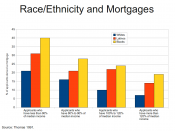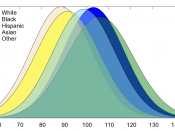The first chapter of the reading speaks mostly about the differences in the percentages of certain racial groups in crime. Throughout the periods, such as the 1980's; described here in this chapter, minorities including African-Americans and Latinos and have a higher rate of serving prison sentences however they either have equal or lower rates of criminal activities then whites. The differences the author tried to examine is that there is a racial stereotype that most people have against minorities as well as people below the poverty level which in most situations are minorities anyhow. The police and other authorities "feel" that they have more of a need enforce the law upon neighborhoods that are predominately populated by the minorities, and have less of a duty to protect them from crimes and acts of violence.
If a person of color is driving a car and them don't fit the description of a person that should be driving that type of car, especially if the license plates are out-of-state, that person has a high chance of being pulled over by the police and questioned or harassed.
Even doctors, professors, and other well-off, educated people that are members of a particular racial group are usual seen as potential criminals just because of their racial backgrounds. The author seems to have an underlining cynical view of how these people are treated by society just because they are not white, although throughout most of the work, the author presents more facts then personal opinion. This was somewhat unsurprising since it is such a sensitive subject and more times then not people who speak about such issues keep their opinions played down or just hint of their conviction until the end.
The next chapter included in this reading is about the misuse of funds and switching of wealth among the wealthy only! Only thing that happens is that the rich get richer and the poor stay poor if not get poorer. Why should low-income American's have to pay for a debt that they did not create, while the top one percent of high-earning families get to placed in a tax bracket of only 39.6 percent. Here, I felt there was a stronger opinion then in the pervious chapter.
I was surprised to see more facts presented in this reading then personal opinions and/or reasoning and logic behind such a subject. Of course since I joined the class late, I am at a lost to actually reading this author's work before now. From the title of the chapter, I except more of a logical reasoning of a belief based upon the facts. The second chapter included in the reading was mainly about the misuse of money in society and how the rich only get richer and this keeps the poor down. I find it interesting that the author seemed plainly in the choice of the words used and examples was more comfortable speaking about this subject then in the first chapter which focused more on race. Is it so much of a surprise however? Probably not since it is easier to speak about money and making a "race" of the rich against the "race" of the poor. I think there is an entire course in store just taking into consideration of how an author can have the differences in writings between these to subjects.





